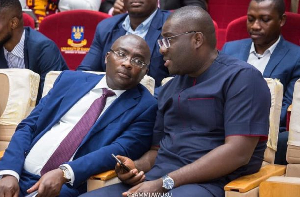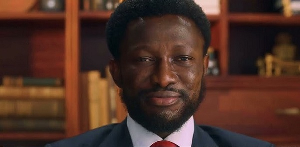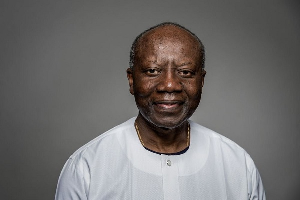By Kojo Ayidan
I don’t believe I am the only one who has noticed the indifference and conspicuous silence of the media on the poor quality telecom services in this country; the silence of the media is so deafening it is not funny anymore.
It is about time the media stopped describing us as listeners, viewers and readers; and it is time the telecom companies stopped describing us as subscribers or customers. We are citizens; human beings, whose rights are being blatantly violated, through the indecent flirtation between the media and the telecom operators.
The radio stations in particular, are very loud about problems with the other utility services; water and electricity. But they say very little about the daily problems we face trying to make calls on our mobile phones; and it is not as if people do not complain about the problems they face – the call drops, speech mutation, calls not going through, network congestion, wrong voice prompts, no coverage and all the others. There is also the dysfunctional broadband and snail-pace wireless internet services.
Due to the age-old network challenges, we lose money directly and indirectly everyday, and sometimes we even lose valuable business and social relationships. The telecom operators make a boast of the ‘supersonic speed’ of their wireless dongles, but our reality is that these dongles are so slow and they suck credit so fast. As for broadband, the least said about it the better.
When calls drop or speech goes mute whiles we are speaking on phone, we lose money instantly because we make the call all over again and we are charged afresh for as many times as the problem occurs through no fault of ours.
We lose money indirectly when we are not able to receive calls meant to bring us some business. For instance, I manage a group and I use an MTN line as my business line. People, who often call me for express gigs, tell me that more often than not that they called and my phone was off so they got another person to do the gig. Meanwhile at the time in question my phone was on. Because of this, I now have three different lines from three networks.
Sometimes too, when we send a text message once, the message repeats itself automatically and we are charged for the second one too, even though we did not authorise it.
A friend of mine had a problem with his fiancé because of one of these network problems. His fiancé called but his phone did not ring, even though the lady insisted that the phone rung on her side. The relationship is on the rocks because of that incident. Obviously the phone did not help the relationship on that occasion, even though the telecom operators promised to help build relationships.
These are real social issues that reflect the public’s experience with telecom service; and that is precisely why the Consumer Protection Agency (CPA) recently called on all phone users to put off their phone for six hours in protest of poor quality network service.
These are the issues that the media are supposed, as a matter of necessity and duty, to talk about. But the CPA’s campaign and demonstration received very scanty media attention; such a huge matter of public concern and the media was almost indifferent about it.
The media is essentially the voice of the voiceless, but the media today seem to be doing more of speaking for the telecom companies and other corporate organisations than for the people who are being given a raw deal daily.
Indeed, why would the media talk about the way we the telecom subscribers are losing money due to poor service, when most of the guys in the media are being feted by the telecom operators? Most of the broadcasters and journalists are partners and ambassadors of telecom operators and they get phones, phone credits, laptops and internet access for free, so they do not lose money no matter how poor the services are.
Again, it is becoming increasing difficult to distinguish between telecom operators and gaming companies in this country. It seems the telecom companies are doing more gambling than the National Lotteries Authority, which has the mandate and expertise for gambling. The telecom operators were licensed to offer communications service. Gambling is just something on the side, but they seem to be doing more of that than giving value to their customers in terms of communication. Indeed their so-called value-added services are more about fleecing money from customers through the sale of ring tones and caller tunes. They are abusing the concept of convergence and sacrificing quality of service for mobile gaming. In fact they even gamble with the loyalty of the very customers they have failed to offer quality service to.
The worse the media could have done is to have looked on unconcerned, but the media is rather facilitating the telecom operators’ schemes to fleece money from their customers, but they do not highlight the problems we face with the poor services of telecom operators.
The telecom operators use the media extensively to promote their gambling tactics, to lure millions of customers to participate, even though at the end of the day only an insignificantly few customers win the prizes. The media seem to jump to the idea of helping to advance the money-sucking promotions more quickly than they do the complaints of the voiceless masses about the poor services of the telecom operators. All the radio presenters do live presenter mentions (LPMs) for one telecom promotion or the other everyday, but they say nothing about customer concerns.
It is not for nothing that the media has taken such a stance when it comes to the telecom industry in this country. They get paid heavily for the promotions, but they are not paid to talk about customer complaints.
Watching television or listening to radio today, one would think that without the telecom companies the media cannot survive. Every single programme and even the various segments in every magazine programme are sponsored by one telecom operator or the other. Even the presenters get confused sometimes as to which company sponsors what segment on their programmes. It is not uncommon lately to find the logo of one telecom operator or the other on the bottom corner of the television screen, to tell us that that programme is being sponsored by that company. Even TV news is sponsored by telecom companies. Viasat1 one is the only television station which does not do that crude and ‘obscene’ display of company logos on programmes.
Rune Skogeng, the Chief Executive Officer of Viasat1 noted that it is their policy to separate commercial time from programming time on Viasat1. They run adverts for telecom operators, and mention the operators’ names as sponsors of particular programmes at the various break spots during the programme, but they do not display the logo of the sponsor on the screen whiles the programme is showing. Mr. Skogeng says that practice is unprofessional, sub-standard and below international standards. Again, it is only Viasat1, which does not mention the themes of the various telecom operators in their adverts. For instance themes like “MTN, everywhere you go,” is not said on a Viasat1 voice over, but all the other stations say those words as if they can actually vouch for that claim.
On radio magazine programmes like the various morning shows and afternoon drive time shows, we always here “this segment is brought to you by MTN, or TIGO, or KASAPA, or VODAFONE, or ZAIN;” and I am very sure, very soon GLO will join the band wagon, if they do not leave the country as they are threatening to do.
Beyond that, some of the telecom operators, particularly MTN, have very lucrative barter relationships with very strategic media houses and individual broadcasters and journalists, some of whom they have named MTN Partners and Ambassadors. When it comes to telecom, these media houses and persons speak for the telecom operators, instead of for us the voiceless masses. That is why some of these broadcasters do LPMs for MTN’s 90 Cars in 90 Days promotion and say that, ‘a text message costs ONLY 75 Ghana pesewas’. Since when did 7,500 cedis for a single text message become ‘only’? That is worth someone’s lunch.
The foregoing clearly explains why the media are not talking about telecom at all. Telecom is so huge and the issues in there are so vast that if a radio or television station or even a newspaper decides to allot time and space for a programme or column to specifically discuss telecom issues once a week, that programme or column can run non-stop for years with relevant issues every week. The problems that we, the customers, are facing alone will provide enough material for discussion and articles every week.
Take for instance, the simple analogy that the Alliance for Accountable Governance (AFAG) made recently – that increase in supply eventually leads to price cuts. There are as many as six multinational telecom operators in Ghana, far more than there are in some developed countries, and yet call tariffs are still relatively high in this country. This issue can be a topic for radio or TV discussion, but no station is taking it up because when the telecom operators make their money, they share with the media organisations.
The telecom operators know that courting the media is the best way to cover their backs and continue to give the masses a raw deal and get away with it. They have ‘bought’ all the media houses, broadcasters and journalists, who have the voice to speak to the real issues. MTN for instance is the title sponsor for the GJA Awards and I am told they are getting adverts worth 80 billion old cedis (eight million Ghana cedis) from some print media houses (names withheld) in return. The question is, how much of the public complaints about MTN’s poor network quality would these newspapers focus on, when they are aware that too much of that can cost the whole of the GJA its sponsorship package from MTN?
The flirtation between the media and the telecom operators may be benefiting some individual media houses in terms of funds to keep operating, and it is obviously benefiting the telecom operators in terms of platform to promote their ‘sticky’ services and money-sucking gambling promotions. But we the masses, who constitute the customers/subscribers of the telecom operators and audiences of the media, are suffering in silence, because even if we decide to take advantage of the media phone-ins to talk for ourselves, due to poor quality networks, our calls do not get through for us to be heard.
The regulator, National Communications Authority, has questions to answer on the issue of network quality because they issued licenses that allow the operators to meet only 70 per cent success rate, or what they call minimum quality of service (QoS); so those of us who fall within the 30 per cent non-success zone, are on our own. The media has the power to rally the masses on a campaign that focuses on consumer interests with regards to the operators’ performance and the regulatory regime, and trust you me, something drastic will be done about this issue. Until the media uses its power the right way, to help the masses instead of the telecom operators and themselves, these problems will not go away.
ENDS
Opinions of Wednesday, 30 June 2010
Columnist: Ayidan, Kojo














